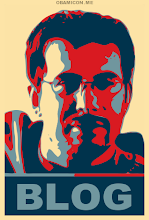 FORGET THE ECONOMY, I WANT TO BOMB, BOMB IRAN!
FORGET THE ECONOMY, I WANT TO BOMB, BOMB IRAN!You could say Nathan George's Berkeley home was like a Trojan horse.
Through Sen. John McCain's campaign website, George summoned follow conservatives to his home to watch the first presidential debate last Friday evening.
In the bastion of liberal ideology, the group of 14 was like strangers in a strange land, nestled just a block from Shattuck Avenue where students with piercings galore and the scent of incense wafted down the street.
“I thought about putting out a sign,” said George, a native of North Carolina who is working on his doctoral degree at Cal, “but I decided against it.”
A large part of this election's storyline has been a return to grassroots activism married with the ability of the internet to bring people together.
Aside from a few conservative college students, the party brought McCain supporters from well-to-do Bay Area locales such as Kensington and Montclair.
Everyone in attendance indicated this was the first time ever participating in such event and most seemed firmly in the Arizona senator's camp.
“This debate shows that McCain is up to the job. McCain was successful in putting the pressure on Obama,” said James Shinn of Kensington, “The last half of the debate Obama had to keep defending himself.”
Shinn, who is a retired foreign diplomat served in Southeast Asia, Pakistan, and various Central European nations had a keen view of the debate which primarily dealt with foreign policy issues that tend to play well to McCain's strengths.
During a contentious moment during the last half of the debate regarding Sen. Barack Obama's position of talking to the foreign leaders of countries in conflict with the U.S., Shinn was in agreement with McCain's cautious approach.
“Being a diplomat, you cannot sit across the table and allow free reign in a meeting because what happens is like what McCain said they'll say this and you'll say no you can't.”
He also disagreed with Obama's rebuttal that Iranian President Mahmoud Ahmedinejad is not even the country's top decision maker.
“Sure, he's not the top guy, but he's out there and he's doing what the ayatollahs want him to say,” Shinn said while also citing Ahmedinejad's inflammatory statements at the United Nations earlier in the week.
Others cited McCain's foreign policy chops as the reason why they believed their candidate was successful last Friday.
“Clearly the turning point was the way he talked about all the foreign places he had visited and his experiences there,” said George.
Leigh Dukatt, a McCain supporter from Emeryville, also thought McCain showed a mastery of foreign policy while exhibiting his tendency to buck party lines.
“He knew what he was talking about. I liked how he talked about opposing some previous conflicts like in Lebanon. McCain showed he is the right guy for the job,” Dukatt said.
If instant polling of Friday's debate is to believed, despite McCain's foreign policy advantage, Americans believed Obama won the first matchup of presidential candidates.
Whereas many political observers viewed the debate as a barometer of how well Obama could stand up to criticism that he's inexperienced, some at the debate party were interested in the opposite.
Shinn, like many other pundits finds overtones in these debates with the 1980 presidential election when Ronald Reagan's lack of executive gravitas was opposed by a president foundering in a weak economy, except he believes McCain is the candidate Americans need to decide whether they are comfortable sitting in the Oval Office and not Obama.
“The Democrats said he was cowboy and didn't know anything and wasn't up to the job. People wondered 'am I comfortable with him on the button?' That's what elections are about in America, 'how comfortable am I with this person?” said Shinn.
In fact, the Cold War-era question of “who will have their finger on the button” was curiously mentioned by the group on three occasions during a post-debate discussion.
Friday's debate was aired amidst heightened worries over the economy, yet few of the McCain supporters, who said they were fiscally conservative Republicans against expanding government, were uninterested in the candidates opening remarks.
“The economy is not my top concern,” said George, “A president gets his top people to handle the economy.”
Others take a more pragmatic approach and believe McCain should take a more populist approach in his rhetoric rather than cautiously matching Obama's what-and-see approach to the economy.
“McCain could do more, but he's caught being in the party he's in,” said Shinn, “He should go four square on this bailout issue. He should hammer populist themes against golden parachutes and corporate greed.”



No comments:
Post a Comment